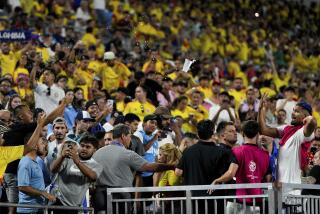Brazil’s World Cup opening day brings protests, home team victory
- Share via
Reporting from Sao Paulo, Brazil — Police in Brazil clashed with protesters before the World Cup soccer tournament kicked off Thursday, leaving at least eight demonstrators and three journalists injured. Much of the country stayed home to watch the game on TV.
In Sao Paulo, police fired tear gas and rubber bullets to stop a few hundred protesters from blocking a metro line between downtown and the Arena Corinthians stadium, striking CNN correspondent Shasta Darlington and producer Barbara Arvanitidis as well as a cameraman from local channel SBT, Douglas Barbieri. Darlington and Arvanitidis were released from medical care in the early afternoon.
------------
FOR THE RECORD:
Brazil protests: In the June 13 Section A, an article about demonstrations in Brazil incorrectly used a male pronoun to refer to soccer fan Michelli Provensi. Provensi is a woman.
------------
“The police were unnecessarily aggressive. It wasn’t the demonstrators that started the provocation,” said Erica Alves, a 27-year-old teacher.
Brazil has seen numerous protests during the last year by citizens who said officials overspent on the World Cup while neglecting the needs of the population. Residents have complained of the high costs for the tournament and the poor quality of public education, healthcare and transportation infrastructure.
Protests also took place Thursday in other cities that will host tournament events, such as Rio de Janeiro, Belo Horizonte, Fortaleza and Porto Alegre. Rio’s protest was the largest, bringing together 1,000 people, according to police estimates cited in local media.
But the size of demonstrations on the tournament’s opening day, which included Brazil defeating Croatia, 3-1, paled in comparison with those last June, when more than a million Brazilians took the streets during the Confederations Cup soccer tournament. It appeared the government had been able to resolve most of the issues that had periodically plunged much of the country into chaos since early May.
Metro strikers decided late Wednesday to call off their strike permanently despite ongoing conflicts and the now-victorious Homeless Workers movement chose to host a celebration at the land they won from the government — and watch the game there — instead of staging a protest.
Many in Sao Paulo were given the day off from work or school Thursday, and the city, ordinarily ensnarled in traffic, was calm for most of the day.
Fans and dignitaries making their way to the stadium passed through poor neighborhoods, where families were often hosting barbecues to watch the game at home. Some buildings throughout the city had been painted in green and yellow, the colors of the Brazilian team, and others featured anti-tournament graffiti.
“World Cup for whom? We want education!” read one graffiti tag visible on the approach to the stadium.
Despite obvious signs that construction was not fully finished and some confusion as fans tried to find their seats, the new Arena Corinthians stadium was packed with 65,000 fans, mostly clad in Brazil’s yellow.
In downtown Sao Paulo, foreign visitors complained that an outdoor party organized by FIFA, the international soccer federation, to broadcast the game to fans on a big-screen TV was poorly organized.
“It’s crushed there. We had to leave as it was just too dangerous,” said Ben Silburn, a fan from Nottingham, England. “Everyone here is very friendly and nice, but it’s just not a good place to watch a game.”
Others expressed mixed feelings about the World Cup from the safety of their homes.
“I feel totally divided about the Cup — I’m passionate about football, but at the same time there feels something very wrong about this,” said Michelli Provensi, a 29-year-old from the southern state of Santa Catarina, who watched the game at his friend’s house. “But no matter how much money has been spent unwisely, or wasted, or stolen, I can’t not cheer for the Brazilian team — it’s our passion.”
Bevins is a special correspondent. Claire Rigby also contributed to this report.
More to Read
Sign up for Essential California
The most important California stories and recommendations in your inbox every morning.
You may occasionally receive promotional content from the Los Angeles Times.










